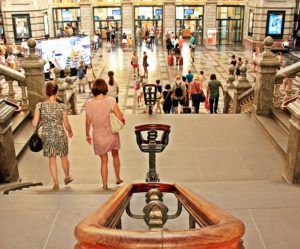New York has some of the oldest residential buildings in America. Some of them go back as far as 90 years or more. Because these buildings are so old, they predate elevators. Residents, visitors, and others are required to climb stairs in order to get in, out, and around a building. This is true of retail stores, restaurants, apartment buildings, as well as single-family residences that have two or more floors.
Stairs and stairwells, indoors or outdoors, can be very dangerous if not properly maintained. Whether in a private residence, or a publicly accessible building, stairs that are not properly maintained can be very dangerous for those who use them. Loose or damaged stairs and missing handrails are some of the most dangerous conditions for a person who isn’t familiar with the layout.
Someone who falls on a flight of stairs, especially downward, can be injured or even killed by their own body weight.
The Duty of Care
 As part of New York premises law, property owners are required to keep all their property, including stairs and stairwells, in good working order and in a reasonably safe condition. That is, they are required to be safe for anyone who visits the property, whether they are invitee, licensee, or trespasser, and no matter whether the property is public or private.
As part of New York premises law, property owners are required to keep all their property, including stairs and stairwells, in good working order and in a reasonably safe condition. That is, they are required to be safe for anyone who visits the property, whether they are invitee, licensee, or trespasser, and no matter whether the property is public or private.
Be aware that the other party is very likely to use the defense that you caused your own accident. In other words, you were at least partially responsible for your accident, or “contributory negligence.”
But it’s also possible that a dangerous defect is not completely visible and may not be discoverable without a thorough investigation. Using the term “assumed risk,” the other party will likely raise the defense that the plaintiff knew or should have known that the hazard existed but decided to walk up or down the defective stairs anyway.
Unsafe Stairs
Accidents in stairwells in common areas are the most frequent accidents involving stairways. They are usually caused by unsafe conditions such as:
- Incorrectly designed or built stairs
- Unstable, on even, or broken steps
- Slippery or slick stairs, especially if there is no anti-slip guard in place
- Insufficient lighting
- Missing and or defective handrails or banisters
- Carpet that is either worn or loosely woven
- A height and depth of a step that is not proportionate
- Outdoor stairs that are iced over or wet
- Other violations of code or regulations
Transient conditions, such as an object left on the stairs, substances like oil or water, trash, or garbage that read to the hazardous conditions can also cause accidents if not corrected.
Injuries On Staircases
Stairs that are incorrectly built or not properly maintained are a hazard for anyone who uses them. Falling on stairs can leave you with injuries such as:
- Bone fractures and breaks
- Joint damage., especially to the hands and elbows while trying to prevent the fall
- Head and neck injuries
- Facial injuries
- Lacerations and bruising
- Traumatic brain injuries, such as concussion
- Spinal damage, including spinal cord injuries, ruptured and herniated discs
- Soft tissue jury injury, including ligament damage
They are more likely to be more serious than if you’d fallen flat on a sidewalk. Staircase injuries can be costly with years of recovery. In some cases, the accident can result in permanent disability.
Establishing And Proving Negligence Under Premises Liability.
Property owners have a duty of care to ensure that their property—including the stairwell—is safe for everyone who uses it. This includes providing visual warnings to any dangers that may not be completely apparent.
 While it’s very possible that some accidents truly are accidental, there are other times when an accident is caused by an ignored hazard. A property owner is required to remedy such a situation when it becomes known, or they should have known that the hazard existed.
While it’s very possible that some accidents truly are accidental, there are other times when an accident is caused by an ignored hazard. A property owner is required to remedy such a situation when it becomes known, or they should have known that the hazard existed.
As a plaintiff, one must be ready and able to prove that the hazard was the result of negligence on the part of the property owner by answering these questions:
- Was the property owner or other party Responsible for the hazard that caused the accident?
- Was the owner aware of the problem, but failed to take corrective action?
- Did the owner fail to take care of maintenance, which would have alerted them to the problem ahead of time?
An immediate investigation will uncover whether the property owner was negligent in the duty of care owed to keep the premises stairs safe.
Compensation For Injuries
From the moment you stop moving, you will begin to incur accident-related expenses. Depending on the severity of your injuries, you could be unemployed for a month, a year, or longer. You may even be permanently disabled and never able to return to your previous occupation.
A personal injury claim will help you recover some of these losses. Expenses such as:
- Medical expenses, present, and future
- Hospital expenses
- Physical therapy
- Diagnostic Testing
- Prescriptions
- Loss of income
- Loss of future earning capacity, if disability results
- Pain and suffering
Can be recoverable with a personal injury claim and/or lawsuit.

Of course, you will also hear from the other party’s insurance company. No matter what they say, don’t speak to them. They are interested in finding ways of denying your claim and making sure that you can’t collect. Don’t make the mistake of giving any insurance company “a statement over the phone.”
Inevitably, anything you say will be used to ruin your claim before or after filing a lawsuit. Speak with a personal injury attorney first and let them handle the calls.
How A Staircase Accident Lawyers Can Help You
if you suffered serious injuries from a fall on a staircase, well the first thing you need to concentrate on is taking care of yourself and healing your injuries. Trying to handle a claim against another party while you’re still hurt can lead to bad mistakes and either denied or lower amounts of compensation. You deserve to be compensated for the losses you suffered. Working with a New York City staircase accident lawyer will work to get you the maximum amount of compensation available.
Don’t leave your future to chance. Call us at (888) 998-7165 or tell us about your case using our online contact form. We will review your case at no charge and let you know about your legal options with no obligation.

 As part of New York premises law, property owners are required to keep all their property, including stairs and stairwells, in good working order and in a reasonably safe condition. That is, they are required to be safe for anyone who visits the property, whether they are invitee, licensee, or trespasser, and no matter whether the property is public or private.
As part of New York premises law, property owners are required to keep all their property, including stairs and stairwells, in good working order and in a reasonably safe condition. That is, they are required to be safe for anyone who visits the property, whether they are invitee, licensee, or trespasser, and no matter whether the property is public or private. While it’s very possible that some accidents truly are accidental, there are other times when an accident is caused by an ignored hazard. A property owner is required to remedy such a situation when it becomes known, or they should have known that the hazard existed.
While it’s very possible that some accidents truly are accidental, there are other times when an accident is caused by an ignored hazard. A property owner is required to remedy such a situation when it becomes known, or they should have known that the hazard existed.